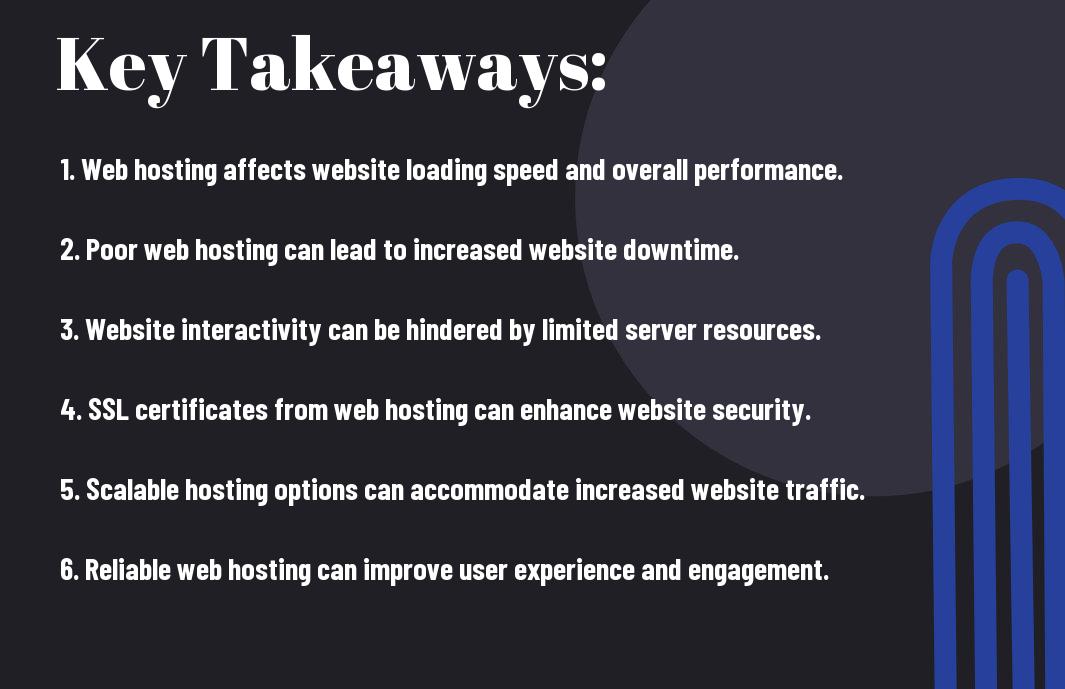Staggeringly, the choice of web hosting for your website can have a profound effect on its interactivity and user experience. The right web hosting provider can positively impact the speed, security, and overall performance of your site, making it easier for your visitors to navigate and interact with your content. On the other hand, choosing a poor web hosting provider can lead to dangerous consequences such as slow loading times, frequent downtimes, and increased vulnerability to cyber attacks. In this blog post, we will explore how web hosting directly influences the interactivity of your website and provide you with important considerations to keep in mind when selecting a web hosting provider for your online presence.
Key Takeaways:
- Web hosting directly affects website load times: The choice of web hosting provider can have a significant impact on website interactivity, as slow load times can lead to decreased user engagement and higher bounce rates.
- Server location can influence user experience: The physical location of the web hosting server can affect how quickly content is delivered to users, especially for visitors located far from the server’s location.
- Quality web hosting is essential for responsive websites: Choosing a reliable and high-performance web hosting provider is crucial for ensuring a smooth and interactive user experience, as well as supporting advanced website features like e-commerce or multimedia content.

Understanding Web Hosting
The impact of web hosting on the interactivity of your website is crucial for maintaining a strong online presence. When visitors land on your website, you want them to be engaged and have a seamless experience. As discussed in our previous blog post The Importance of Animation and User Interaction on Your, a well-hosted website can significantly enhance user interaction and overall engagement.
Definition and Key Features
Web hosting refers to the service that allows individuals and organizations to make their website accessible via the World Wide Web. The key features of web hosting include storage space, bandwidth, uptime, security, and customer support. Having a reliable web hosting provider is crucial for ensuring that your website is accessible to your audience at all times. Knowing the key features of web hosting will enable you to make an informed decision when choosing a hosting provider.
- Storage space: This refers to the amount of data you can store on the server.
- Bandwidth: It determines the amount of data that can be transferred between your website and users.
- Uptime: This is the amount of time your website is accessible and operational.
- Security: A secure hosting provider ensures protection against potential cyber threats.
- Customer support: Access to reliable customer support is essential for resolving any hosting issues promptly.
Types of Web Hosting Services
When it comes to web hosting, there are various types of services available, each catering to specific needs. Perceiving the differences between these types of hosting services will help you determine which option best suits your website’s requirements. Here are the main types of web hosting services:
| Type | Description |
|---|---|
| Shared hosting | Multiple websites share the resources of a single server |
| VPS hosting | A virtual private server is created by partitioning a physical server into multiple virtual servers |
| Dedicated hosting | An entire server is dedicated to a single customer |
| Cloud hosting | Resources are spread across multiple interconnected servers |
| Managed hosting | The hosting provider manages the technical aspects of the server |
Web Hosting Performance Factors
Now, let’s talk about the factors that directly impact the performance of your website hosting. When it comes to the interactivity of your website, the speed, availability, and capability of your web hosting play a crucial role in determining how responsive and engaging your website can be. It’s important to consider these factors when choosing a web hosting provider for your interactive website. Interactive Websites: Your Birds-Eye-View [Examples, …
Server Speed and Uptime
Having a fast and reliable server is key to ensuring that your website loads quickly and is always available to your visitors. Server speed affects the loading time of your website, while uptime determines how often your website is accessible to your audience. A slow server or frequent downtime can negatively impact user experience and discourage visitor engagement. Perceiving these factors crucial to the interactivity of your website.
Bandwidth and Data Transfer Rates
Bandwidth and data transfer rates determine the amount of data that can be transferred to and from your website. If you exceed your allocated bandwidth, your website may experience slow loading times or even temporary unavailability. It is important to choose a hosting plan with adequate bandwidth to accommodate the interactive features of your website, such as videos, animations, and live chats.
Web Hosting and User Experience
Unlike other aspects of website development, web hosting plays a crucial role in determining the overall user experience of your website. The choice of web hosting can directly impact how users interact with your website, influencing factors such as load times, responsiveness, and scalability.
Impact on Load Times and Responsiveness
When it comes to user experience, load times and responsiveness are key factors in keeping visitors engaged on your website. Poor web hosting can result in slow loading times and unresponsive pages, leading to frustration for your visitors. Your choice of web hosting can greatly impact the speed at which your website loads and how quickly it responds to user actions. Fast load times and responsive design are crucial for keeping visitors on your site and encouraging them to interact with your content.
Scalability and Support for Interactive Features
As your website grows and evolves, the scalability and support for interactive features become increasingly important. A quality web hosting service will provide the resources and support necessary to enable interactive elements such as live chat, e-commerce functionality, and multimedia content. Choosing a web hosting provider that offers scalability and support for interactive features is essential for ensuring that your website can adapt to the changing needs of your audience.

Choosing the Right Web Hosting for Interactivity
After understanding the impact of web hosting on website interactivity, the next crucial step is to choose the right web hosting for your website. Your choice of web hosting provider will directly affect the speed, performance, and overall interactivity of your website. Therefore, it’s essential to carefully consider your options before making a decision.
Criteria for Selecting a Web Host
When selecting a web host for your interactive website, there are several key factors to consider. Reliability and uptime are critical, as a reliable web host ensures that your website remains accessible to your audience at all times. Speed and performance are also crucial, as slow loading times can negatively impact user experience and interactivity. Additionally, consider the scalability of the web hosting provider, as your website’s interactivity may increase over time, requiring more resources. Finally, customer support is important, as you’ll want a web host that can assist you promptly if issues arise.
Best Practices for Maximizing Website Interactivity
To maximize website interactivity, there are several best practices you can implement. Firstly, optimize your website’s images and multimedia to ensure fast loading times and seamless user experience. Utilize responsive design to ensure that your website is accessible and interactive across various devices. Additionally, implement caching mechanisms to enhance website performance and interactivity. Lastly, regularly monitor and analyze your website’s metrics to identify areas for improvement and ensure optimal interactivity.
The Impact of Web Hosting on Website Interactivity
The impact of web hosting on website interactivity is significant in determining the speed, reliability, and functionality of your website. By choosing the right web hosting provider, you can ensure that your website runs smoothly, loads quickly, and provides a seamless interactive experience for your visitors. Factors such as server location, bandwidth, and uptime guarantee all play a crucial role in determining the level of interactivity and user experience on your website. It is essential to carefully consider the impact of web hosting on website interactivity when selecting a hosting provider to ensure the success of your online presence.
FAQ
Q: What is web hosting?
A: Web hosting is a service that allows individuals and organizations to make their website accessible via the World Wide Web. It provides the technologies and services needed for a website to be viewed online.
Q: How does web hosting impact website interactivity?
A: The quality of web hosting can directly impact website interactivity. Faster loading speeds and reliable uptime provided by a good web hosting service can make a website more responsive and interactive for users.
Q: What are some factors to consider when choosing a web hosting service for website interactivity?
A: Factors to consider include server speed, uptime reliability, customer support, security features, scalability, and the ability to handle high traffic volumes. These factors can directly impact website interactivity and user experience.
Q: How does server speed affect website interactivity?
A: Faster server speeds provided by a web hosting service result in quicker loading times for web pages. This, in turn, improves website interactivity by reducing lag and allowing users to access and interact with the content more efficiently.
Q: Can a web hosting service improve website interactivity for mobile users?
A: Yes, a good web hosting service can optimize websites for mobile devices, ensuring faster loading times and a smoother user experience. This can significantly improve website interactivity for mobile users, who now represent a large portion of internet traffic.
CATEGORY:Uncategorized

